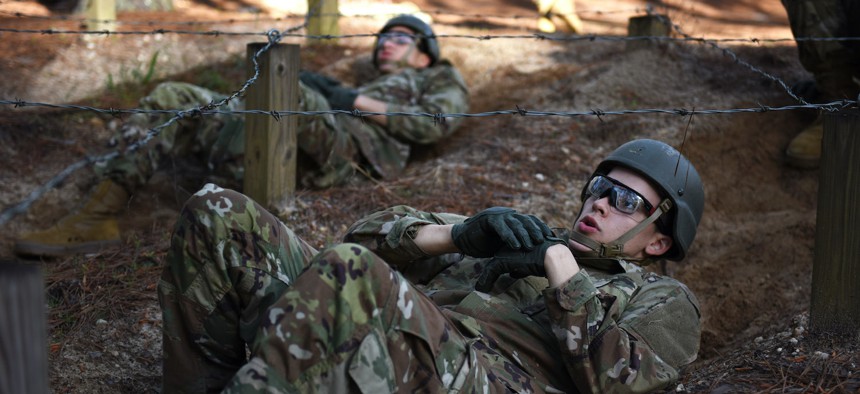
Army infantry recruits crawl under barbed wire as part of the confidence course on Fort Benning, Georgia, March 29, 2023. U.S. Army / Christopher Hurd
Army launches the second phase of its ad campaign amid recruiting slump
New ads continue Army’s focus on the needs of Gen-Z.
The Army launched the second wave of its advertising push to boost recruitment numbers on Monday, building on its March re-launch of its 1980s “Be All You Can Be” slogan.
The ad push comes as the Army continues to struggle to hit its recruiting goals amid what Army Secretary Christine Wormuth has called the “most challenging recruitment environment in years.”
The Army fell short by 25 percent of its goal of recruiting 60,000 soldiers last year, and will likely fall short of its goal of 65,000 recruits for this year, Wormuth told Congress in May.
The ads released Monday and dubbed the “First Steps” campaign, feature three videos showing recruits parting from their families to go to training, learning tank gunnery, and graduating from training.
The films collectively are intended to increase the Army’s “relatability,” one of several areas Army research said is important for attracting Gen-Z recruits. Other focus areas include knowledge, culture, and trust, Acting Chief of Army Enterprise Marketing Ignatios Mavridis told Defense One.
The videos feature a diverse range of Americans, and will also be broadcast in Spanish. “We want America's Army to look like America,” Mavridis said.
Mavridis expects to see initial results from the “First Steps” campaign sometime in December or January. The metric of success will be how many people supply their information to the military for further contact, such as submitting their email to the Army recruiting website or giving their phone number to a recruiter.
The previously released “Be All You Can Be” campaign, aired in March, has been a success, Mavridis said. According to Army data, the campaign led to a 78 percent increase in brand recall, a marketing term that refers to the degree to which an individual remembers an organization.
The March campaign originally featured actor Jonathon Majors, but the Army pulled those ads just days after airing them and replaced them with others when Majors was accused of domestic violence. Mavridis said the Army will not re-air the ads.
The Army’s recruiting crisis is balanced by the Army’s generally high retention rate, but the shortfalls are nevertheless pushing the Army to consider reducing its number of units. That may include a restructuring of Army special operation forces, whose utility has faded as the U.S. winds down its once heavy focus on counter-terrorism operations, Wormuth told Army Times in June.
To combat the shortfall, the Army moved up its “Be All You Can Be” campaign by five months and has launched a number of initiatives, including a focus on 15 cities and programs aimed at helping otherwise eligible candidates meet physical and testing requirements.
So far, Army recruitment efforts appear to be having a positive effect: Army Chief of Staff Gen. James McConville said numbers to date have so far been better than last year.







